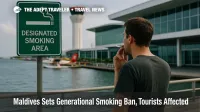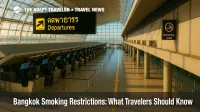Smoking Ban
Traveling, for many, is a chance to experience new cultures, landscapes, and cuisines. However, it also brings with it a set of challenges and adjustments, especially for those who smoke. The issue of smoking bans in travel has garnered increasing attention over the years, driven by public health initiatives and growing awareness of the harmful effects of secondhand smoke. This comprehensive examination delves into the multifaceted aspects of smoking bans as they pertain to travel and how these regulations impact various stakeholders.
Historical Context
Historically, smoking was once an accepted part of travel. Airlines, buses, trains, and even cruise ships had designated smoking areas. In fact, up until the late 20th century, smoking was so prevalent that non-smoking sections seemed more like the minority.
However, growing evidence about the health hazards of smoking and secondhand smoke catalyzed a shift in policy. The 1970s and 1980s saw the beginning of regulatory changes, leading to smoking restrictions in public transport. By the 1990s and early 2000s, smoking bans became more stringent, thanks to advocacy from health organizations and government regulations.
Air Travel
Air travel has perhaps seen the most significant changes regarding smoking bans. The evolution began with the introduction of non-smoking sections, which quickly proved insufficient due to the confined space and limited air circulation within the cabin. In 1988, the United States took a pioneering step by implementing a smoking ban on all domestic flights lasting less than two hours. The regulation extended to international flights and all flight durations over the ensuing years.
Today, virtually all commercial airlines worldwide have comprehensive smoking bans in place. This includes the prohibition of e-cigarettes and vaping devices, which some travelers might mistakenly believe to be exceptions. Enforcement is rigorous, with heavy fines and penalties for violators, including the risk of being placed on a no-fly list.
Trains
Train travel varies greatly by region when it comes to smoking regulations. In Europe, where high-speed trains like the Eurostar and Thalys connect major cities, smoking bans are strictly enforced. The Eurostar, for example, has a zero-tolerance policy on smoking, extending to electronic cigarettes as well. The reasoning is clear: Ensuring the comfort and health of all passengers in what is essentially a shared, confined environment.
In contrast, some regions still permit smoking in designated areas on trains. For example, certain long-distance trains in Russia and parts of Asia maintain smoking sections. However, this is gradually changing as global trends favor smoke-free environments. The challenge lies in balancing cultural norms with health guidelines, making policy implementation a delicate task.
Cruise Ships
Cruise ships offer another interesting dimension to the discussion of smoking bans in travel. These floating cities cater to diverse demographics, including both smokers and non-smokers. As such, cruise lines have to navigate the tricky waters of policy-making carefully.
Most major cruise lines now designate specific smoking areas, often limited to certain decks or lounges. Smoking in cabins is typically banned due to fire hazards, except on some ships that provide designated smoking staterooms. Interestingly, the rules for vaping on cruises are not always as clear-cut, with some lines treating e-cigarettes differently than traditional cigarettes. As with air travel, passengers are advised to consult their specific cruise line's policies to avoid misunderstandings and potential penalties.
Car Rentals and Ride-Sharing Services
The realm of car rentals and ride-sharing services like Uber and Lyft has its own set of smoking regulations. Most car rental companies apply strict no-smoking policies across their fleets. The residue and odor left by smoking inside a vehicle can be difficult and costly to remove, leading to additional cleaning fees should a renter violate this rule.
Ride-sharing services similarly uphold non-smoking policies for drivers and passengers alike. Users generally appreciate smoke-free rides as they contribute to a more pleasant and comfortable experience. Drivers who do smoke typically use designated breaks outside the vehicle to avoid negative ratings and complaints.
International Policies
While the trend toward smoking bans in travel is global, there's significant variation in how these regulations are applied country by country. Nations such as Australia and Canada have some of the strictest anti-smoking laws, extending far beyond travel to public spaces and even private vehicles in certain circumstances.
In contrast, smoking regulations can be more lenient in parts of Europe, the Middle East, and Asia. For instance, in Japan, while smoking is banned on public transportation, designated smoking rooms are common in train stations and airports. Travelers must be aware of differing regional laws to avoid fines and ensure respectful adherence to local customs.
Traveler Experience
For smoking travelers, these bans present both inconvenience and a call to adapt. Many have turned to nicotine patches, gums, or vaping (where permitted) to cope during long journeys. Airports often have smoking lounges, although their availability is decreasing. Preparing ahead by researching stopovers and layovers can significantly mitigate the inconvenience.
Non-smoking travelers generally benefit from these regulations, enjoying cleaner, healthier environments and fewer disturbances. Public sentiment largely supports smoking bans, aligning with broader public health initiatives aiming to reduce smoking rates and exposure to secondhand smoke.
Future Trends
The trajectory of smoking bans in travel appears poised to continue its trend towards stricter enforcement and broader application. Innovations in transportation and travel experience design increasingly prioritize health, safety, and comfort. Legislators and travel industry stakeholders aim to strike a balance that respects individual freedoms while protecting public wellbeing.
The impact of these trends is twofold: Encouraging smokers to seek alternatives and fostering a cleaner travel environment for everyone. Emerging technologies might offer new solutions, such as advancements in smokeless nicotine delivery systems that mitigate health risks without compromising user satisfaction.
The intersection of smoking bans and travel is an evolving landscape shaped by health priorities, cultural shifts, and technological advancements. As global awareness and regulatory environments continue to evolve, both travelers and industry stakeholders must navigate these changes thoughtfully and proactively.
Maldives Sets Generational Smoking Ban, Tourists Affected

San Sebastián to ban smoking on beaches, target June 2026

Bangkok smoking restrictions: what travelers must know now

Spain Set to Ban Smoking on Terraces, Beaches, Bus Stops

France Extends No-Smoking Zones for 2025

Spain Tightens Beach, Nightlife, and Dress-Code Rules for 2025

Exploring Smoking Bans: Countries Leading the Way in Public Health

Understanding Mexico's Smoking Regulations: A Traveler's Guide

